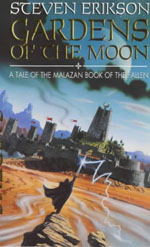 Gardens of the Moon is the first volume in Steven Erikson’s Malazan Empire series. I was drawn to the series after hearing roughly a dozen different people heap mighty amounts of praise upon it. Although it was still shockingly unavailable in the United States , I managed to obtain the first three paperbacks from www.amazon.ca. (Tor has now acquired the rights to the series and will be releasing Gardens of the Moon sometime this summer.)
Gardens of the Moon is the first volume in Steven Erikson’s Malazan Empire series. I was drawn to the series after hearing roughly a dozen different people heap mighty amounts of praise upon it. Although it was still shockingly unavailable in the United States , I managed to obtain the first three paperbacks from www.amazon.ca. (Tor has now acquired the rights to the series and will be releasing Gardens of the Moon sometime this summer.)
I think Gardens of the Moon can best be described as “epic fantasy with the dial cranked up to 11”: The dragons, empires, and wars are all bigger. The cast of characters is larger. The intrigues more convoluted. The elder races more alien. The magic more powerful (and its forms more mysterious). Even the world is too big for the map (and its only one of many).
And I mean all of that in the best possible way.
No, seriously, I do. Erikson has invested his world with some truly amazing depth and a truly astounding scope, and it’s perfectly delightful to behold.
For example, Erikson manages to detail a complex, interwoven set of magical systems – yet, at the same time, his magic feels magical. He manages to sidestep the trap of making magic nothing more than an alternative physics, but he also doesn’t cheat by simply drawing a curtain across its workings.
Another remarkable thing about Gardens of the Moon is the history. Its so thick that it seems to ooze right off the page. And its not just the world which has received this lavish attention: Every single character has been gifted with a rich backstory that, once it becomes apparent, gives them a life and vitality and reality all their own.
I could rave on for quite some time in this vein, because Erikson has truly created a marvelously complex and lovingly detailed world: A work of art with few equals.
Unfortunately, not everything about Gardens of the Moon is so deserving of praise. The book is, to put it bluntly, very rough around the edges. Where Erikson succeeds so brilliantly at evoking a world and creating a compelling plot, he frequently falls down when it comes to prose and (most importantly) basic storytelling. And what is perhaps most frustrating about these latter flaws is that you can see, here and there throughout the book, that he is capable of so much better.
It was nearly 150 pages before I began to have something resembling a firm grasp on what was happening. Erikson dumps you right into the middle of a complex society, history, cast of characters, and action – and then skips around like a rabid rabbit, flashing forward and backward in time, between characters, and across continents.
To be perfectly clear here: It’s not simply starting you in the middle of things which is the problem here. I don’t have any problem with starting a story in media res. But Erikson never stops. No narrative thread is held onto for longer than a couple of pages. You’re constantly flipping between the literally dozens of POV characters and are never allowed a chance to focus your attention on anything.
Adding to this problem is Erikson’s concerted effort to withhold information from one end of the book to the other: Unnamed characters do cryptic, unexplained things to other characters (who are frequently no more than a name on the page); false cliffhangers are created through selective description; motivations are often left unexplained until hundreds of pages after the fact.
Which leads to another problem: There are significant spans of the novel where characters stop doing things for any particular reason and start doing them because, well, that’s what happens next (and, besides, they need to do it so that something else can happen later on). Sometimes this is just an impression left by Erikson holding back essential information. And sometimes its justified by having gods explicitly or implicitly mucking around in the mix. But, just as frequently, the only all-powerful hand at work seems to be the author’s, fating characters to an inevitable outline.
(This is all simultaneously contrasted and highlighted rather oddly by a stretch of the book in which vast amounts of secret history comes spilling out during a casual conversation between two characters. I was left with the vague sensation of taking a walk with someone and having them casually – and for no apparent reason – describe the secret history of the Illuminati, the Masons’ involvement in the Fall of Atlantis, and the secret war between the Templars and Papist Loyalists over the Holy Grail in Victorian India. Ironically, very little of this conversation actually serves to directly illuminate the active threads of the plot.)
In the end, I was simply left with the vague feeling that – if I had known everything I knew by the end of the book at the beginning of the book – the whole work would have been a lot more effective for me.
More than anything, though, I’m left with a general feeling of inconsistency, because, like I said, there are large spans of the book where Erikson’s potential shines through unfettered by these storytelling flaws. (Most notably the last 150 pages flew by with only a couple of rough spots standing in the way.)
A couple more problems I need to throw out here before moving on:
First, Erikson cannot write poetry. Which is unfortunate, because he spreads it around pretty liberally in the books. Fortunately, the vast majority of it is found at the beginning of chapters and is easily skipped.
Second, someone hereabouts mentioned recently that Erikson has a tin ear for names, and that’s true in spades. He varies between two extremes: Names which are common words (Burn, Sorry, Whiskeyjack, Hairlock) and names which are nearly unpronounceable. Mixed inbetween the two extremes are more traditional-sounding fantasy names (Kalam, Paran) and a few names drawn from the real world (Quick Ben). The result is simply chaos, and I surely can’t see any rhyme or reason to the divisions: Whether a character is a god, a mage, a noble, or a common soldier seems to have no bearing whatsoever on the type of name they’ll possess.
Okay, I’ve now spent nearly a dozen paragraphs hashing out the problems I had with Gardens of the Moon. But take all that with a pinch of salt: The only reason that these problems stand out like sore thumbs is because they mar what would otherwise be a colossal triumph and achievement.
Erikson offers a rich world, spectacular settings, and powerful characters tied together in a plot of epic proportions and fiendish intrigue. If he ends up tripping over his feet every so often in the process, then that’s something I’m willing to forgive.
Before I bring this to an end, there’s one last thing that I want to point out: Gardens of the Moon functions as a stand-alone novel, not just the first volume in a series. The story being told here has a beginning, a middle, and an end. There are also clearly some threads which will be picked up and used later in the series, but they’re handled in a way which is entirely consistent with Gardens of the Moon having an independent existence. So even if you’re the type of person who doesn’t want to pick up an unfinished series, you might want to give Gardens of the Moon a try.
GRADE: B+
Steven Erikson
Published: 2003
Publishers: Tor
Cover Price: $18.00
ISBN: 0-765-31001-5












